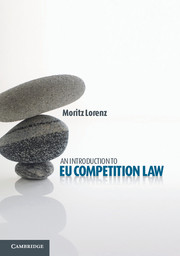Book contents
1 - Economic and legal foundations of EU competition law
Published online by Cambridge University Press: 05 May 2013
Summary
The benefits of competition
There is a general belief among societies that have adopted the market economy as their economic model that competition brings various benefits. Competition is believed to ensure low prices and a broad range of choices for consumers as well as overall efficiency and innovation. This is also reflected in statements of the Directorate General for Competition (DG COMP) of the European Commission (hereinafter: the Commission):
Competition is a basic mechanism of the market economy which encourages companies to offer consumers goods and services at the most favourable terms. It encourages efficiency and innovation and reduces prices. In order to be effective, competition requires companies to act independently of each other, but subject to the competitive pressure exerted by the others.
The last sentence of the above statement indicates what lies at the core of the concept of competition: the view that consumers and suppliers should interact freely and according to their own incentives, without any coordination between market players. In such a setting, competition will act as a self-regulating mechanism, an ‘invisible hand’, that drives prices down to their socially optimal level and ensures maximum welfare for society as a whole.
The term ‘invisible hand’ was phrased by Adam Smith in his book The Wealth of Nations in the eighteenth century. Smith used the term ‘invisible hand’ in a specific context, namely a discussion of domestic versus foreign trade. However, the concept has since been generalised to the functioning of the market in general. Indeed, Smith stated that the invisible hand worked in the case of domestic versus foreign trade ‘as in many other cases’, already indicating the potential wider application of the concept himself. Smith also clearly recognised that the invisible hand would be steered by each market player striving for its own goals: ‘It is not from the benevolence of the butcher, the brewer, or the baker that we expect our dinner, but from their regard to their own interest.’
- Type
- Chapter
- Information
- An Introduction to EU Competition Law , pp. 1 - 61Publisher: Cambridge University PressPrint publication year: 2013



